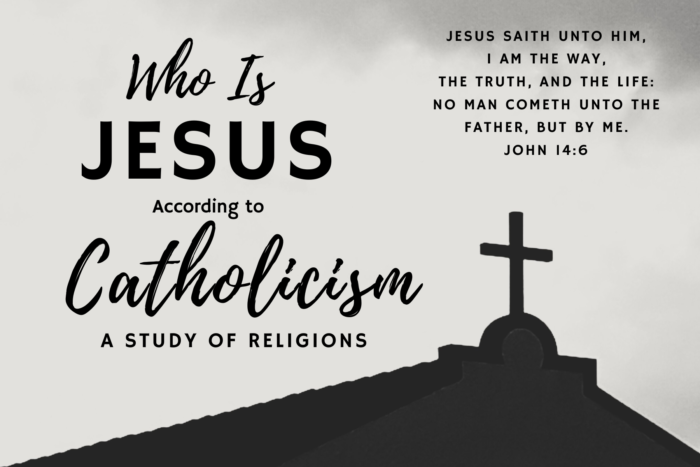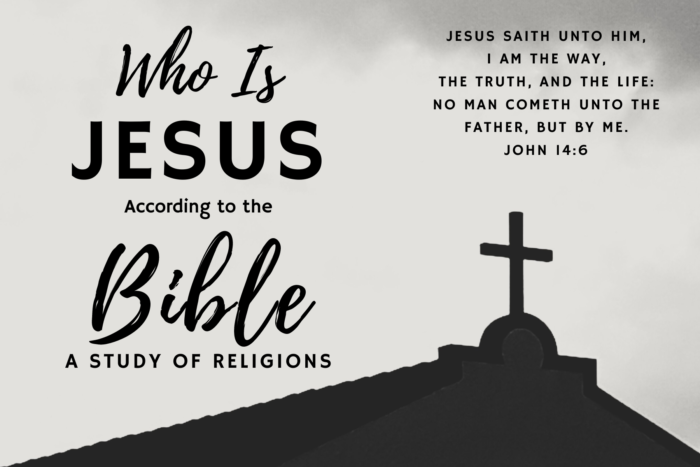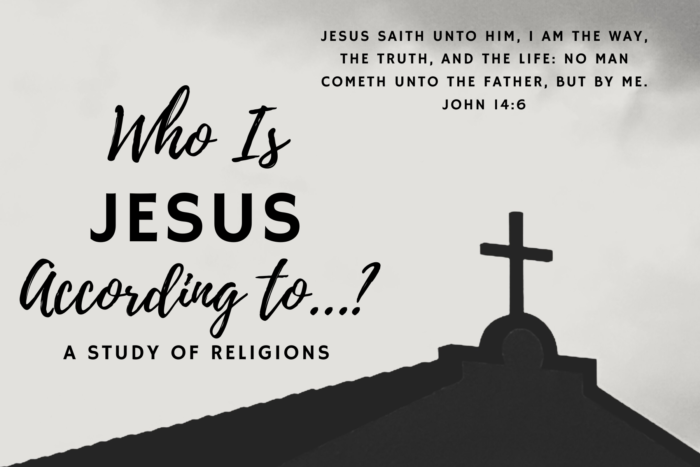In this current age we are living, Catholicism is presented, almost without debate, as a Christian religion. But is it really what it claims to be or is it a counterfeit? It is important that we know the answer to this question, as the calls to imitate and unify with this religion are many and come from all arenas of Christian culture.
We see this unity happening in the music industry where artists are teaming up for concerts; we see it among evangelical pastors, who give credence to and partner with Catholic speakers and authors; we see it among the Christian population, who have adopted many of the mystic practices encouraged by monks of old; and, most recently, we see it in the apathy held by the church, at large, regarding their “Christian” entertainment, including books, tv shows, movies, videos and podcasts that make no delineation between Catholicism and true Christianity (most recently we see this regarding the Catholic actor who is playing Jesus in the Chosen).
As we continue our study, it is important that we remember the role of God’s Word in converting those caught up in any false system. While researching this particular religion, God led me to a book called The Truth Set Us Free (Twenty-three Former Nuns Tell Their Stories) (link in the bibliography which can be found in attached pdf) and in every single case, God used His Word to convict and to convert. It was without exception. Our only anchor and our only hope is the Word of God—not only for living our own lives but for any attempt to draw people away from deception and false doctrine. All other arguments and debates are useless. May we remember this, even as we proceed on to other religions. The only thing that matters is how do the beliefs of any religion compare to the Bible, God’s Holy Word?
I have learned so much as I have researched the religion of Catholicism, its history, and its beliefs. Much of the heresy began when Constantine made the Catholic church the state religion back in the early 300s. Combining the paganism of Rome with the tenets of Christianity led to a muddled mess. It was at this time that the church was wed to many pagan practices. This helps to explain the goddess worship of Mary that began to make its way into the church, which continued to grow and be developed even up until the late 1800s. It explains the pagan practices of worshipping and praying to dead people they called “saints” (a practice expressly forbidden by God). And it explains why there are so many ungodly practices in the church that are found absolutely nowhere in the Bible—things like purgatory, indulgences, celibacy, the supremacy of church tradition over scripture, the infallibility of the pope, salvation by sacraments, and so many others.
And, while these unbiblical practices clearly condemn this religion as false, today I want to acquaint you specifically with Catholicism’s view of Jesus Christ. I will use both their own catechism and canons from the Council of Trent (the numbered paragraphs correspond with the “Catechism of the Catholic Church”, which can be easily found online. The Council of Trent Canons, found later on in this document, are also easily found. Links for both of these are found in the bibliography.)
What does the Catholic church teach about Jesus, according to their own official documentation?
1. JESUS NEEDS HELP IN REDEEMING MANKIND.
The Catholic church teaches that Mary is “Co-redemptrix” and, in fact, that she has more mercy and kindness than her Son. “Thou, Mary, art my only hope” was written by Liguori in his “Glories of Mary” (an author who was declared to be free from error). In other words, Jesus needs help from his mommy. The belief is beyond sacrilegious and is in absolute contrast to scripture.
Keep in mind that none of this is found in scripture anywhere. What we DO find in scripture are abundant references to Christ’s supremacy and power (Philippians 2:9-11; Colossians 1:13-20; Hebrews 1:1-8; Revelation 1:5-8). Here are some of their beliefs, with the corresponding catechism section–
#493 The Fathers of the Eastern tradition call the Mother of God “the All-Holy” (Panagia), and celebrate her as “free from any stain of sin, as though fashioned by the Holy Spirit and formed as a new creature.” By the grace of God Mary remained free of every personal sin her whole life long.
- She is a perpetual virgin
#499 The deepening of faith in the virginal motherhood led the Church to confess Mary’s real and perpetual virginity even in the act of giving birth to the Son of God made man. In fact, Christ’s birth “did not diminish his mother’s virginal integrity but sanctified it.” And so the liturgy of the Church celebrates Mary as Aeiparthenos, the “Ever-virgin.”
- She is Christ’s partner in salvation
#964 Mary’s role in the Church is inseparable from her union with Christ and flows directly from it. “This union of the mother with the Son in the work of salvation is made manifest from the time of Christ’s virginal conception up to his death”; it is made manifest above all at the hour of his Passion.
WHAT DOES THE BIBLE TEACH?
Not only can we find no verses to support the above beliefs, but we find verses that go directly against them—
The Bible teaches that ALL are sinners except Christ. This includes Mary.
As it is written, There is none righteous, no, not one:There is none that understandeth, there is none that seeketh after God.They are all gone out of the way, they are together become unprofitable; there is none that doeth good, no, not one. (Romans 3:10-12)
And ye know that he was manifested to take away our sins; and in him is no sin. (I John 3:5)
The Bible teaches that CHRIST ALONE is our Redeemer, through His blood—
Having predestinated us unto the adoption of children by Jesus Christ to himself, according to the good pleasure of his will,To the praise of the glory of his grace, wherein he hath made us accepted in the beloved.In whom we have redemption through his blood, the forgiveness of sins, according to the riches of his grace (Ephesians 5:1-7)
And when he had taken the book, the four beasts and four and twenty elders fell down before the Lamb, having every one of them harps, and golden vials full of odours, which are the prayers of saints.And they sung a new song, saying, Thou art worthy to take the book, and to open the seals thereof: for thou wast slain, and hast redeemed us to God by thy blood out of every kindred, and tongue, and people, and nation; (Revelation 5:8-9)
The Bible teaches that Jesus alone is our only way to salvation—
He that believeth on the Son hath everlasting life: and he that believeth not the Son shall not see life; but the wrath of God abideth on him. (John 3:36)
Jesus saith unto him, I am the way, the truth, and the life: no man cometh unto the Father, but by me. (John 14:6)
2. CHRIST IS CRUCIFIED CONTINUALLY THROUGH THE EUCHARIST
In the mass, Catholics take communion with the belief that the bread and wine become Jesus’s actual body and blood through a process they call transubstantiation. Thus, His crucifixion continues on forever. This is why you see that Jesus is often still hanging on a Catholic cross. For they have left Him there with their false doctrine.
- The Bread and Wine (the Eucharist) become the actual body and blood of Jesus
#1333 At the heart of the Eucharistic celebration are the bread and wine that, by the words of Christ and the invocation of the Holy Spirit, become Christ’s Body and Blood. Faithful to the Lord’s command the Church continues to do, in his memory and until his glorious return, what he did on the eve of his Passion: “He took bread. . . .” “He took the cup filled with wine. . . .” The signs of bread and wine become, in a way surpassing understanding, the Body and Blood of Christ…
#1365 Because it is the memorial of Christ’s Passover, the Eucharist is also a sacrifice. The sacrificial character of the Eucharist is manifested in the very words of institution: “This is my body which is given for you” and “This cup which is poured out for you is the New Covenant in my blood.” In the Eucharist Christ gives us the very body which he gave up for us on the cross, the very blood which he “poured out for many for the forgiveness of sins.”
#1375 It is by the conversion of the bread and wine into Christ’s body and blood that Christ becomes present in this sacrament. The Church Fathers strongly affirmed the faith of the Church in the efficacy of the Word of Christ and of the action of the Holy Spirit to bring about this conversion.
#1376 The Council of Trent summarizes the Catholic faith by declaring: “Because Christ our Redeemer said that it was truly his body that he was offering under the species of bread, it has always been the conviction of the Church of God, and this holy Council now declares again, that by the consecration of the bread and wine there takes place a change of the whole substance of the bread into the substance of the body of Christ our Lord and of the whole substance of the wine into the substance of his blood. This change the holy Catholic Church has fittingly and properly called transubstantiation.”
#1413 By the consecration the transubstantiation of the bread and wine into the Body and Blood of Christ is brought about. Under the consecrated species of bread and wine Christ himself, living and glorious, is present in a true, real, and substantial manner: his Body and his Blood, with his soul and his divinity (cf. Council of Trent: DS 1640; 1651).
- Redemption and forgiveness are carried out through participating in the Eucharist
#1364 In the New Testament, the memorial takes on new meaning. When the Church celebrates the Eucharist, she commemorates Christ’s Passover, and it is made present the sacrifice Christ offered once for all on the cross remains ever present.185 “As often as the sacrifice of the Cross by which ‘Christ our Pasch has been sacrificed’ is celebrated on the altar, the work of our redemption is carried out.”
#1393 Holy Communion separates us from sin. The body of Christ we receive in Holy Communion is “given up for us,” and the blood we drink “shed for the many for the forgiveness of sins.” For this reason the Eucharist cannot unite us to Christ without at the same time cleansing us from past sins and preserving us from future sins:
- The Eucharist is offered to impart grace to those who have died but were “not yet wholly purified”.
#1371 The Eucharistic sacrifice is also offered for the faithful departed who “have died in Christ but are not yet wholly purified,”193 so that they may be able to enter into the light and peace of Christ:
WHAT DOES THE BIBLE TEACH?
The Bible speaks directly against the Eucharist and the assertions of its purposes.
The Bible teaches that Jesus Christ’s work was finished on the cross–
Jesus died once and rose again victorious over sin and death. As already proven by verses above. I would also add these two important verses to refute Catholic doctrine–
When Jesus therefore had received the vinegar, he said, It is finished: and he bowed his head, and gave up the ghost. (John 19:30)
For in that he died, he died unto sin once: but in that he liveth, he liveth unto God. (Romans 6:10)
The Bible teaches that those who are redeemed go immediately to be with Christ–
We also know that when a redeemed child of God dies they are immediately present with the Lord. There is no purgatory, no praying for a soul that has departed this life, and no ritual that can be performed to determine their eternal destiny. What an insidious lie.
We are confident, I say, and willing rather to be absent from the body, and to be present with the Lord. (2 Corinthians 5:8)
For I am in a strait betwixt two, having a desire to depart, and to be with Christ; which is far better:(Philippians 1:23)
3. THE POWER OF THE CHURCH (and PRIESTS) TO FORGIVE SINS
The Catholic church asserts that the priest’s are given the divine power to forgive sins, as stated in their catechism.
#976 The Apostle’s Creed associates faith in the forgiveness of sins not only with faith in the Holy Spirit, but also with faith in the Church and in the communion of saints. It was when he gave the Holy Spirit to his apostles that the risen Christ conferred on them his own divine power to forgive sins: “Receive the Holy Spirit. If you forgive the sins of any, they are forgiven; if you retain the sins of any, they are retained.”
#983 Catechesis strives to awaken and nourish in the faithful faith in the incomparable greatness of the risen Christ’s gift to his Church: the mission and the power to forgive sins through the ministry of the apostles and their successors:
#984 The Creed links “the forgiveness of sins” with its profession of faith in the Holy Spirit, for the risen Christ entrusted to the apostles the power to forgive sins when he gave them the Holy Spirit.
#986 By Christ’s will, the Church possesses the power to forgive the sins of the baptized and exercises it through bishops and priests normally in the sacrament of Penance.
WHAT DOES THE BIBLE TEACH?
The Bible teaches that Christ is the only One Who has the power forgive sins.
Nowhere in scripture do we find Him delegating this task to any human. Consider the pride and arrogance that leads to such a belief!
But that ye may know that the Son of man hath power on earth to forgive sins, (then saith he to the sick of the palsy,) Arise, take up thy bed, and go unto thine house. (Matthew 9:6)
Forbearing one another, and forgiving one another, if any man have a quarrel against any: even as Christ forgave you, so also do ye. (Colossians 3:13)
But if we walk in the light, as he is in the light, we have fellowship one with another, and the blood of Jesus Christ his Son cleanseth us from all sin.If we say that we have no sin, we deceive ourselves, and the truth is not in us.If we confess our sins, he is faithful and just to forgive us our sins, and to cleanse us from all unrighteousness. (I John 1:7-9)
4. THE UNBIBLICAL ROLE OF PRIESTS
Along with forgiveness of sins, priests are bestowed with other divine attributes. Attributes that are never given or assigned to any human being in scripture.
- Priests are considered to have the power to act on Christ’s behalf
#1548 In the ecclesial service of the ordained minister, it is Christ himself who is present to his Church as Head of his Body, Shepherd of his flock, high priest of the redemptive sacrifice, Teacher of Truth. This is what the Church means by saying that the priest, by virtue of the sacrament of Holy Orders, acts in persona Christi Capitis:
It is the same priest, Christ Jesus, whose sacred person his minister truly represents. Now the minister, by reason of the sacerdotal consecration which he has received, is truly made like to the high priest and possesses the authority to act in the power and place of the person of Christ himself (virtute ac persona ipsius Christi).
- Priests serves as mediators between God and man
According to the St. Aquinas Seminary Website: Catholic priests serve primarily as mediators between God and man, linking the human and divine realms through the person of Christ. They are, in the words of St. Paul, ministers of Christ and the dispensers of the mysteries of God, taken from among men, yet appointed for men in the things that pertain to God. Priests thus form an indispensable bond uniting Heaven and earth.
WHAT DOES THE BIBLE TEACH?
The Bible teaches that Christ is our only High Priest and Mediator.
Wherefore, holy brethren, partakers of the heavenly calling, consider the Apostle and High Priest of our profession, Christ Jesus; (Hebrews 3:1)
Seeing then that we have a great high priest, that is passed into the heavens, Jesus the Son of God, let us hold fast our profession.For we have not an high priest which cannot be touched with the feeling of our infirmities; but was in all points tempted like as we are, yet without sin. (Hebrews 4:14-15)
For there is one God, and one mediator between God and men, the man Christ Jesus; (I Timothy 2:5)
5. THE ANATHEMAS OF THE COUNCIL OF TRENT
The Council of Trent, held in the 15th century, upheld certain anathemas (a person or thing accursed or consigned to damnation or destruction) that pronounced the biblical gospel as heresy. The Council of Trent has continued to be upheld by the Roman Catholic church and has never been rescinded. From these canons, we see that Catholic church does not believe that Christ’s work was finished on the cross and they assert that more is needed than just His sacrifice for our salvation. Please review the following canons that were confirmed at this Council—
Grace alone, through faith alone, in Christ alone is simply not enough.
Council of Trent, Sixth Session Canon 9-If any one saith, that by faith alone the impious is justified; in such wise as to mean, that nothing else is required to co-operate in order to the obtaining the grace of Justification, and that it is not in any way necessary, that he be prepared and disposed by the movement of his own will; let him be anathema.
COT, Sixth Session, Canon 12. -If any one saith, that justifying faith is nothing else but confidence in the divine mercy which remits sins for Christ’s sake; or, that this confidence alone is that whereby we are justified; let him be anathema.
Good Works contribute to and are necessary for our Salvation.
COT, Sixth Session, Canon 24 -If any one saith, that the justice received is not preserved and also increased before God through good works; but that the said works are merely the fruits and signs of Justification obtained, but not a cause of the increase thereof; let him be anathema.
Christ’s sacrifice is not enough to save us from punishment—either in purgatory or eternally.
COT, Sixth Session, Canon 30. If any one saith, that, after the grace of Justification has been received, to every penitent sinner the guilt is remitted, and the debt of eternal punishment is blotted out in such wise, that there remains not any debt of temporal punishment to be discharged either in this world, or in the next in Purgatory, before the entrance to the kingdom of heaven can be opened (to him); let him be anathema.
Christ’s grace is conferred in Baptism.
COT, Fifth Session, Canon 5. If any one denies, that, by the grace of our Lord Jesus Christ, which is conferred in baptism, the guilt of original sin is remitted; or even asserts that the whole of that which has the true and proper nature of sin is not taken away; but says that it is only rased, or not imputed; let him be anathema.
WHAT DOES THE BIBLE TEACH?
The Bible teaches that we are saved by grace alone, through faith alone, in Christ alone.
And as Moses lifted up the serpent in the wilderness, even so must the Son of man be lifted up:That whosoever believeth in him should not perish, but have eternal life.For God so loved the world, that he gave his only begotten Son, that whosoever believeth in him should not perish, but have everlasting life. (John 3:14-16)
That if thou shalt confess with thy mouth the Lord Jesus, and shalt believe in thine heart that God hath raised him from the dead, thou shalt be saved.For with the heart man believeth unto righteousness; and with the mouth confession is made unto salvation. (Romans 10:9-10)
For by grace are ye saved through faith; and that not of yourselves: it is the gift of God:Not of works, lest any man should boast. (Ephesians 2:8-9)
The Bible teaches that Christ’s work was finished on the cross.
When Jesus therefore had received the vinegar, he said, It is finished: and he bowed his head, and gave up the ghost. (John 19:30)
Who his own self bare our sins in his own body on the tree, that we, being dead to sins, should live unto righteousness: by whose stripes ye were healed.For ye were as sheep going astray; but are now returned unto the Shepherd and Bishop of your souls. (I Peter 2:24-25)
IN CONCLUSION—
We can clearly see that the Catholic Jesus is not the real Jesus, for that false Jesus did not accomplish salvation on the cross but, according to Catholicism, merely began the process; that false Jesus experiences his death over and over again through the eucharist; that false Jesus needs help from His mother (who has been declared sinless) and from human beings that go by the titles of Pope, Bishop, and Priest; that false Jesus is not powerful enough to keep us from eternal punishment; and that false Jesus demands our good works to help us merit salvation.
Praise God, we know the Bible teaches the complete opposite! Oh, praise God, no one needs to wonder if they’ve done enough good works to merit salvation, because Jesus accomplished all that was necessary for our salvation through His sacrifice on the cross. No good works necessary.
I have focused here on who Jesus is according to Catholicism. However, in my studies, I came across innumerable beliefs about many other topics that, when compared to scripture, easily identify Roman Catholicism as a false religion. But the single thing that always must be asked: What do they do with Jesus? For this is always the crux of the matter.
In conclusion, Catholicism does not teach the truth about our Lord and Savior, Jesus Christ. Attempts to unify with them are impossible, since they do not worship the Jesus of the Bible but some man-made concoction who is called by the same name. The Catholic church has had enormous success in confusing and deceiving people throughout the ages. The discerning believer who holds to the inerrant, inspired, and infallible Word of God will recognize it for what it is: A counterfeit religion that scorns biblical truth.
What does the Bible actually teach about Jesus? Find out at this link. You can find the rest of this series at this link.
PLEASE NOTE: Find a printable pdf of this post in its entirety HERE. You will find a bibliography and list of resources used on the last page of the pdf.












